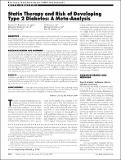| dc.contributor.author | Rajpathak, Swapnil N. | |
| dc.contributor.author | Kumbhani, Dharam J | |
| dc.contributor.author | Crandall, Jill | |
| dc.contributor.author | Barzilai, Nir | |
| dc.contributor.author | Alderman, Michael | |
| dc.contributor.author | Ridker, Paul M. | |
| dc.date.accessioned | 2011-04-23T00:23:30Z | |
| dc.date.issued | 2009 | |
| dc.identifier.citation | Rajpathak, Swapnil N., Dharam J. Kumbhani, Jill Crandall, Nir Barzilai, Michael Alderman, and Paul M. Ridker. 2009. Statin therapy and risk of developing type 2 diabetes: a meta-analysis. Diabetes Care 32(10): 1924-1929. | en_US |
| dc.identifier.issn | 0149-5992 | en_US |
| dc.identifier.uri | http://nrs.harvard.edu/urn-3:HUL.InstRepos:4874756 | |
| dc.description.abstract | OBJECTIVE: Although statin therapy reduces cardiovascular risk, its relationship with the development of diabetes is controversial. The first study (West of Scotland Coronary Prevention Study [WOSCOPS]) that evaluated this association reported a small protective effect but used nonstandardized criteria for diabetes diagnosis. However, results from subsequent hypothesis-testing trials have been inconsistent. The aim of this meta-analysis is to evaluate the possible effect of statin therapy on incident diabetes. RESEARCH DESIGN AND METHODS: A systematic literature search for randomized statin trials that reported data on diabetes through February 2009 was conducted using specific search terms. In addition to the hypothesis-generating data from WOSCOPS, hypothesis-testing data were available from the Heart Protection Study (HPS), the Long-Term Intervention with Pravastatin in Ischemic Disease (LIPID) Study, the Anglo-Scandinavian Cardiac Outcomes Trial (ASCOT), the Justification for the Use of Statins in Prevention: an Intervention Trial Evaluating Rosuvastatin (JUPITER), and the Controlled Rosuvastatin Multinational Study in Heart Failure (CORONA), together including 57,593 patients with mean follow-up of 3.9 years during which 2,082 incident diabetes cases accrued. Weighted averages were reported as risk ratios (RRs) with 95% CIs using a random-effects model. Statistical heterogeneity scores were assessed with the Q and I2 statistic.RESULTS In the meta-analysis of the hypothesis-testing trials, we observed a small increase in diabetes risk (RR 1.13 [95% CI 1.03–1.23]) with no evidence of heterogeneity across trials. However, this estimate was attenuated and no longer significant when the hypothesis-generating trial WOSCOPS was included (1.06 [0.93–1.25]) and also resulted in significant heterogeneity (Q 11.8 [5 d.f.], P = 0.03, I2 = 57.7%). CONCLUSIONS: Although statin therapy greatly lowers vascular risk, including among those with and at risk for diabetes, the relationship of statin therapy to incident diabetes remains uncertain. Future statin trials should be designed to formally address this issue. | en_US |
| dc.language.iso | en_US | en_US |
| dc.publisher | American Diabetes Association | en_US |
| dc.relation.isversionof | doi:10.2337/dc09-0738 | en_US |
| dc.relation.hasversion | http://www.ncbi.nlm.nih.gov/pmc/articles/PMC2752935/pdf/ | en_US |
| dash.license | LAA | |
| dc.subject | meta-analyses | en_US |
| dc.title | Statin therapy and risk of developing type 2 diabetes: a meta-analysis | en_US |
| dc.type | Journal Article | en_US |
| dc.description.version | Version of Record | en_US |
| dc.relation.journal | Diabetes Care | en_US |
| dash.depositing.author | Ridker, Paul M. | |
| dc.date.available | 2011-04-23T00:23:30Z | |
| dash.affiliation.other | SPH^Epidemiology | en_US |
| dash.affiliation.other | HMS^Medicine-Brigham and Women's Hospital | en_US |
| dc.identifier.doi | 10.2337/dc09-0738 | * |
| dash.contributor.affiliated | Kumbhani, Dharam J | |
| dash.contributor.affiliated | Ridker, Paul | |
| dc.identifier.orcid | 0000-0003-1249-4522 | |


